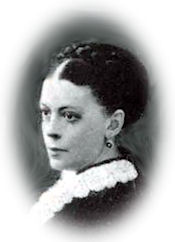October 4th, Saturday.
While Anna and Miriam went out riding last evening, just as I put down my pen, I went out for a solitary walk down the road that Gibbes would have to pass; but saw nothing of the carriage. When I got back, they told me he was wounded. My fears were well founded, then. With what anxiety we waited for his coming it would be impossible to describe. Every wagon rattling through the fields made us stop and listen; every canestalk waving in the moonlight brought us to our feet.
At last, after supper, far off in the clear light we saw the carriage. I could not sit still. I walked down the steps and stood under the tree in front, followed by Anna. I did not like her to stand nearer the spot where it would stop than I, even. All the rest remained on the balcony. We did not know how serious the wound might be; we must be careful. Eugene Carter advised caution for more reasons than one. “Look out!” he cried; “suppose it should be Colonel Breaux?” “Then I am afraid the Colonel will get a kiss,” I answered nervously, shuffling from one foot to the other. “But suppose it is Mr. M——?” he persisted. “Oh, thank you for the caution! I will look carefully before I greet him!” I returned, moving to the other side, for nearer around the circle moved the carriage. I heard his voice.
“O Gibbes, where is it?” “Left shoulder; mere scratch,” he answered. The carriage stopped, “Gibbes! Gibbes!” I cried. “My darling!” and he had his great strong arm around me; the left was hanging in a sling. Slowly the others moved down the steps towards him. What a meeting! My heart was in my throat, I was so happy. Every one caught the well hand and kissed him again and again, and every one shrunk from that left side. I had almost forgotten my “gear Lygia” in my excitement. We followed him on the balcony and put him in a chair near the steps. I pulled off his hat and coat, and knelt in front of him with my arm across his lap, to get near enough. Miriam stood on the steps with his arm around her shoulder, and Lydia near. The others stood around; altogether, it was a happy group that performed in the tableau of “The Soldier’s Return.” Presently the negroes gathered too. “How is you, Mass’ Gibbes?” in all imaginable keys and accents was heard, while the Captain shook hands with each and inquired into their own state of health.
But even wounded soldiers can eat; so supper was again prepared. I am afraid it gave me too much pleasure to cut up his food. It was very agreeable to butter his cornbread, carve his mutton, and spread his preserves; but I doubt whether it could be so pleasant to a strong man, accustomed to do such small services for himself. We listened to him talk, but though it was evident from his slow, deliberate speech, so different from his ordinary habit, that he was suffering, yet I felt impatient when he was interrupted by any commonplace observation by one of us. I wanted to learn something of his exploits. Much knowledge I obtained! He was wounded at Sharpsburg on the 17th September, at nine in the morning. That is all the information I got concerning himself. One would imagine that the seventeen months that have elapsed since we last met had been passed in a prolonged picnic. Concerning others, he was quite communicative. Father Hubert told him he had seen George in the battle, and he had come out safe. Gibbes did not even know that he was in it, until then. Our army, having accomplished its object, recrossed the Potomac, after what was decidedly a drawn battle. Both sides suffered severely.
Hardly an officer on either side escaped unhurt. Mr. McGimsey is wounded, and Major Herron reported killed. I expect the list will contain the names of many friends when it comes.
I have just come from seeing Gibbes’s wound dressed. If that is a scratch, Heaven defend me from wounds! A miné ball struck his left shoulder strap, which caused it to glance, thereby saving the bone. Just above, in the fleshy part, it tore the flesh off in a strip three inches and a half by two. Such a great raw, green, pulpy wound, bound around by a heavy red ridge of flesh! Mrs. Badger, who dressed it, turned sick; Miriam turned away groaning; servants exclaimed with horror; it was the first experience of any, except Mrs. Badger, in wounds. I wanted to try my nerves; so I held the towel around his body and kept the flies off while it was being washed. He talked all the time, ridiculing the groans of sympathy over a “scratch,” and oh, how I loved him for his fortitude! It is so offensive that the water trickling on my dress has obliged me to change it.











